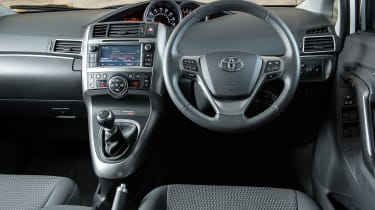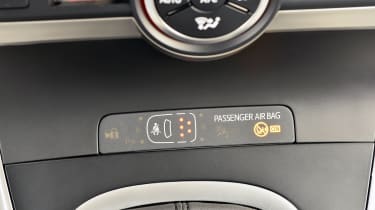Toyota Verso MPV (2013-2018) - Interior & comfort
The Toyota Verso offers space for five adults and the rear seats can carry two kids. There’s plenty of room for the family’s paraphernalia, too
The Toyota Verso has a relatively stiff suspension set-up that means there’s no unseemly pitching and rolling over bumpy, undulating roads, which should keep the chances of child motion sickness to a minimum.
The ride isn’t too hard though, so the Verso manages to deal with the worst the UK’s most lackadaisical road builders can throw at it. It doesn’t crash or shudder over big bumps, and stops smaller ripples infiltrating the cabin.
Toyota Verso dashboard
The Toyota Verso has been designed to be easy to live with, so there’s plenty of adjustment for the seats and steering wheel and the dashboard is clear and easy to find your way around. The gearstick is set high on the dash, so is easy to use, and while it’s slightly quirky these days to have the instruments set in the centre of the dash top, they are at least clear and simple to understand at a glance.
There’s no faulting the way the interior in the Toyota Verso has been put together, but the trims used definitely don’t feel as classy as those in big-name rivals such as the Renault Grand Scenic. It’s all very robust, but you’ll never feel like you can luxuriate in the surroundings of your Verso.
Equipment
The Toyota Verso is pretty well kitted out at standard. It’s available in three specification levels: Active, Icon and Design.
The basic model gets daytime running lights, air-conditioning and a four-speaker radio/CD player with steering wheel-mounted controls.
Going for mid-range Icon trim adds a rear parking camera, automatic wipers, rear door sunshades, dual-zone climate control, cruise control, DAB digital radio, fold-down tables for the second-row seats and a centrally mounted touchscreen.
The top-spec Design model adds a panoramic glass roof, part leather upholstery and sat nav. This offers voice recognition, 3D maps and a text-to-speech function for reading text messages. It also includes three years of free map updates.
Options
There aren’t that many major options, but many smaller accessories. The extra £300 you could spend on front and rear parking sensors should be money well spent, but they're standard on most rivals. Other options are mainly geared towards towing, with a detachable towbar and 13-pin wiring costing £600, and entertaining rear passengers – although powered iPad docks costing £500 seem extravagant.













